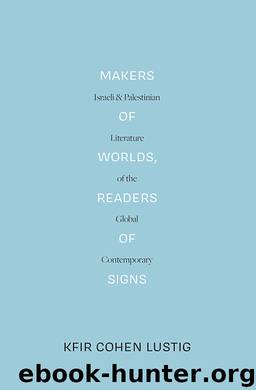Makers of Worlds, Readers of Signs by Kfir Cohen

Author:Kfir Cohen
Language: eng
Format: epub
Publisher: Verso Books
Note the level of detail of the economic logic. Such descriptions are nearly nonexistent in the first statist period and point to two important aspects in Gavron’s work:72 first, however superficial, capital here is the direct object of narration, a new literary phenomenon in Israeli literature. Second, the description of work and the logic of business is not allegorical; it does not signify—as did “work” in the first period—a spiritual collective endeavor whose meaning goes beyond itself. Rather, it is literal. Literality that in the first period was a means of negation in the hands of modernists—especially in Koren and Shabtai—returns here as the positive norm of the everyday.
Other than time as a figure for capital, another layer of Eitan’s characterization concerns the fact that at the outset of the novel he is self-centered and uncaring, a trait that is expressed through his insensitivity towards his girlfriend, Duchi, and their failing relationship. Accordingly, Eitan’s ego-ideal is Jimmy, the CEO, an aggressive narcissist who conceives of life in terms of profit and gain and who exemplifies an extreme version of capitalist culture. As might be expected, time and the relation to the “other” will also define the form—here genre—of the novel itself, and Eitan’s transformation and rejection of time-as-profit will be accompanied with a shift from a solipsistic first person narrative to a detective investigation whose object is someone other to Eitan and whose fate somehow points to the fate of Israeli and Palestinian collectivity.
Eitan’s speech about the call center is then the zero point of the novel, and his world and sense of time begins to change and indeed collapse only when the “political” cuts into his life in the form of repeated attacks. But even more important is the unexpected relation between the private and the political—the fact that, as I have noted, this very menacing violence is written as the necessary condition for pushing Eitan outside the monad of his private life and into the lives of other people. We get a glimpse of this at the outset, when the news of the first attack cuts into Eitan’s day at the office and provides an excuse to talk to people with whom he rarely keeps in touch. As the novel progresses and Eitan becomes the accidental victim of two more attacks, he begins to move out of his private world to look into the death of one of the victims, Giora Guetta. Eitan and Giora were both on the minibus that was bombed at the beginning of the novel, and since they had a brief chance to chat, Eitan feels a responsibility to pass along Giora’s last thoughts to his family. He finds Giora’s diary gadget at the scene of the bombing and tracks down his girlfriend, Shuli, with whom, however unlikely, he has an affair. During their first and meeting, Eitan reflects on the nature of time, signaling a change in his outlook:
The whole situation was so strange to me. For years I’d been continuously running, chasing
Download
This site does not store any files on its server. We only index and link to content provided by other sites. Please contact the content providers to delete copyright contents if any and email us, we'll remove relevant links or contents immediately.
| African | Asian |
| Australian & Oceanian | Canadian |
| Caribbean & Latin American | European |
| Jewish | Middle Eastern |
| Russian | United States |
4 3 2 1: A Novel by Paul Auster(11052)
The handmaid's tale by Margaret Atwood(6854)
Giovanni's Room by James Baldwin(5879)
Big Magic: Creative Living Beyond Fear by Elizabeth Gilbert(4723)
Asking the Right Questions: A Guide to Critical Thinking by M. Neil Browne & Stuart M. Keeley(4576)
On Writing A Memoir of the Craft by Stephen King(4214)
Ego Is the Enemy by Ryan Holiday(3991)
Ken Follett - World without end by Ken Follett(3973)
The Body: A Guide for Occupants by Bill Bryson(3802)
Bluets by Maggie Nelson(3711)
Adulting by Kelly Williams Brown(3671)
Guilty Pleasures by Laurell K Hamilton(3587)
Eat That Frog! by Brian Tracy(3514)
White Noise - A Novel by Don DeLillo(3436)
The Poetry of Pablo Neruda by Pablo Neruda(3367)
Alive: The Story of the Andes Survivors by Piers Paul Read(3311)
The Bookshop by Penelope Fitzgerald(3229)
The Book of Joy by Dalai Lama(3218)
Fingerprints of the Gods by Graham Hancock(3214)
